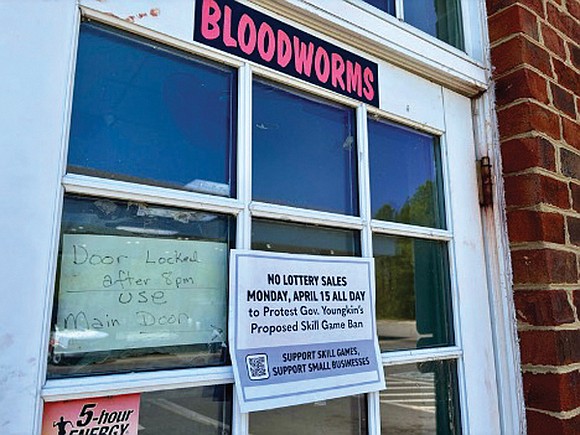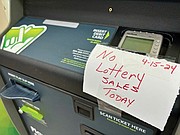Convenience stores shut down Virginia Lottery sales in protest for skill games
Organizers say hundreds of stores participate
Graham Moomaw/Virginia Mercury | 4/18/2024, 6 p.m.

At Krunal Patel’s convenience store outside Richmond, a row of Queen of Virginia skill games has been powered off and turned around against a wall.
On Monday, in response to what he sees as unfair treatment in a state that’s embraced legalized gambling, Mr. Patel also turned off the Virginia Lottery machines in his store.
He posted signs on his front doors and above the checkout counter explaining the one-day shutdown of lottery sales was a protest against Gov. Glenn Youngkin’s proposed changes to a pending Virginia bill that would legalize, tax and regulate skill games instead of leaving them banned as a type of illegal gambling.
In an interview, Mr.Patel, 38, said the slots-like skill games once made up about 30% to 40% of his revenue. But because the governor proposed prohibiting skill games within 35 miles of existing casinos and horse racing facilities, the store he co-owns in eastern Henrico County might be banned from having them due to its proximity to the Colonial Downs race track in neighboring New Kent County.
“If a lot of stores close down, it’s going to close down Lottery too,” Mr. Patel said, when asked what message the temporary stop of lottery sales was supposed to send.
The protest aimed at lottery tickets was the latest escalation in the long-running gambling turf war playing out in Virginia as various interests try to bend state policy in their favor. A coalition supporting skill games said nearly 500 businesses were participating in the lottery shutdown, as well as a plan to close stores entirely on Tuesday from 3:50 p.m. to 4:50 p.m.
“This statewide convenience store shutdown will show customers, communities and localities the harmful impact that Governor Youngkin’s skill game amendments will have,” the pro-skill game Virginia Merchants and Amusement Coalition said in a news release.
After years of grappling with the question of whether the machines should be legal or illegal, Virginia lawmakers were to take up the issue again Wednesday when the General Assembly reconvened to address Gov. Youngkin’s amendments and vetoes. Supporters say Gov. Youngkin’s sweeping amendments to the skill game bill impose the type of public safeguards the General Assembly left out. Critics have called his suggestions so strict they’d effectively ban skill games in most of the state.
In addition to the 35-mile rule, Gov. Youngkin’s amendments would raise the proposed tax rate on the machines from 25% to 35%, allow local governments or local voters to ban the machines at the city and county level and impose stricter rules to prohibit underage play and mitigate gambling addiction.
Concern that skill games might eat into Lottery revenues was one of many reasons the Virginia General Assembly voted to ban the machines in 2020, as was frustration over skill game companies sending unregulated and untaxed machines into the state and insisting gambling laws didn’t apply to their games because, despite the strong resemblance, they technically aren’t slot machines.
When asked for a comment Monday, Gov. Youngkin’s office didn’t directly address the protest.
“The governor supports small business owners having access to skill games and his proposed legislative amendments, stemming from discussions with a bipartisan group of members and dozens of outside stakeholders, would establish an important regulatory framework, enhance consumer and public safety protections, and grant localities and Virginians a voice,” said the governor’s spokesman Christian Martinez.
If the machines do become legal in Virginia, both the General Assembly and Gov. Youngkin have identified the Virginia Lottery as the state agency that should regulate them on a permanent basis.
The General Assembly’s skill game bill calls for the Virginia Alcoholic Beverage and Control Authority to oversee the machines on a temporary basis while the Lottery prepares a fuller regulatory structure. Gov. Youngkin’s proposal sets the Lottery as the regulator from the beginning, even though it would likely delay reactivation of the machines until well into 2025 to allow the agency to create a central monitoring system for keeping tabs on skill games.
That means the target of Monday’s protest could very well end up writing some of the rules for how skill games can and can’t operate.
The Lottery didn’t appear to see Monday’s protest as a major concern, saying the agency has contractual agreements with all retailers who agree to sell tickets that raise funds for Virginia’s K-12 schools.
“The Lottery works with each individual retailer as to what works best for them, and we make it a practice not to tell retailers how to run their business,” said Virginia Lottery spokesman John Hagerty. “The Lottery has nothing to do with skill machines.”
The Lottery gave no indication it was planning to take any action against licensees that stopped selling its products as a form of political protest.
Mr. Patel said he wasn’t sure if he would face any repercussions from the Lottery for stopping sales for a day.
“I’m willing to take that risk,” he said. “At the end of the day, it’s my business.”
Virginia’s casino and horse racing industries have argued they should get some protection from the more scattered competition from skill games because their forms of gambling required significant capital investment. The state’s casinos, for example, had to pay $15 million for a license and pledge to invest at least $300 million in facilities that could only be built in specific cities where voters had approved a casino.
Only a few states have affirmatively legalized and regulated skill games. The machines are fully legal in Wyoming and the District of Columbia, and could be legalized soon in Pennsylvania. Skill games are also legal in Georgia, as long as they don’t offer cash payouts.






